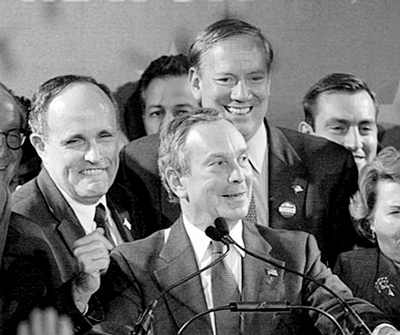Experts claim that Bloomberg administration flouts mandates in schools
Advocates for AIDS education in the New York City public schools are criticizing the Bloomberg administration for not implementing state and city mandates for AIDS lessons in the schools, and accusing the city’s Department of Education for failing to educate thousands of children about the risks of HIV transmission. Moreover, critics charge, revisions to the curriculum, originally scheduled to be implemented this past fall, have twice been delayed and will not be in the classrooms until the fall 2005 at the earliest.
“There is really no focus on it in the schools,” said Robert Fox, 23, program coordinator at Youth Organizers United which took it upon themselves to survey students outside of their schools about the extent to which they were being educated about AIDS in late 2003. “I think this is because it is primarily a black and Latino disease,” said Fox, a Latino.
The New York AIDS Coalition (NYAC), a private affiliation of AIDS activists, has a task force on HIV education in the public schools that first raised concerns about the lack of classroom instruction a year ago. In June 2003, Manhattan Democratic Assemblyman Scott Stringer issued a report that said 63 percent of the city’s school districts “violate the specific mandate on the number of properly trained teachers for either HIV/AIDS or Family Living/Sex Education.” The Department of Education did respond by ordering up revisions to the HIV lessons, but have not shared the newly written curriculum with non-profit AIDS services organizations, who have demanded the right to evaluate them.
“While I appreciate that they want to take their time in incorporating comments, I’m concerned the old curriculum is being used [when it is] with glaring inaccuracies,” said Christina Kazanas, director of state and local affairs at NYAC, who also complains that they have not seen a rollout plan for training teachers and parents on the use of the curriculum.
On January 5, the press office for the Department of Education did not provide answers for some of the questions posed about the HIV/AIDS education program.
Spokesperson Margie Feinberg said she would try to get some answers in the near future and issued a statement that said, “DOE has been actively working with the New York Academy of Medicine and other advisors to revamp and strengthen our entire health education program and to provide quality professional development to support the implementation.”
Some advocates seemed reluctant to criticize Bloomberg for failing to provide adequate AIDS education. “We’re pleased that they have been responsive to the Stringer report in updating this curriculum,” said Adrienne Verrilli, director of communications at the Sexuality Information and Education Council of the United States (SIECUS). “Like all advocates, we’re slightly disappointed that it is taking longer than anticipated.” Verilli added that it is “tragic that the schools are not meeting the mandate and that the kids are not getting the information they need.”
Another advocate, who insisted on anonymity, said that the Department of Eudcation was fixated with standardized academic testing. “Unless you can demonstrate that your program has to do with increasing reading and math scores, they’re not interested,” said the AIDS advocate.
Ann Northrop, a former AIDS educator in the public schools, was more blunt. “I think it is shameful that in the year 2005 we are still begging and pleading for accurate and explicit information about HIV transmission in the public schools. They call this an education system?” Asked what she felt the resistance stemmed from, Northrop, an ACT UP veteran, said, “I think people in power tend to be cowards and want to take the easy way out, even if it is unnecessary. They are afraid that anything approaching ‘sex education’ will provoke a firestorm of criticisms form the rightwing, so it is easier to do nothing.”
Under Mayor David Dinkins in 1991, a comprehensive AIDS education plan was passed by the school system, including condom availability in high schools. While condoms are still supposed to be provided freely in high schools, implementation is spotty. Mayor Rudolph Giuliani banned teachers and outside AIDS education experts from conducting condom demonstrations in classrooms during AIDS lessons, a policy continued by Bloomberg.
Verrilli said that condom lessons were “critically important,” noting, “Kids are smart and responsible and we should respect them enough to give them the full information and skills that they need for a healthy future.”
Claire Simon, program director of Love Heals, a community-based group whose AIDS instructors, some of who are openly HIV-positive, criticized the school system for its lack of “transparency” in developing a new curriculum and rollout plan. “There is a hush around HIV and AIDS,” she said. “There is a sense that it is not as big a problem as before.”
Nairobi Shellow, executive director of Youth Organizers United, said, “It comes down to the privileged young people getting the information—the ones in the good neighborhoods.” Shellow is working on putting together a meeting with public school students and the Office of School Health to go some of the young peoples’ concerns.
gaycitynews.com



































